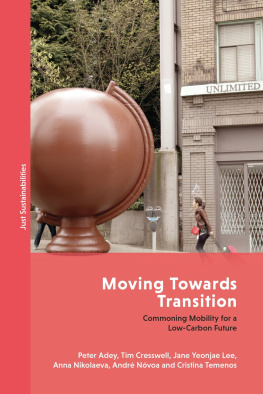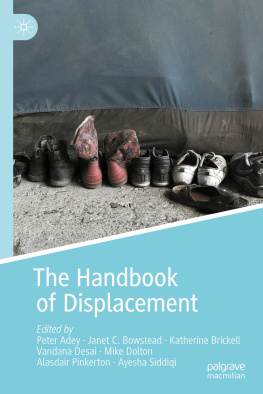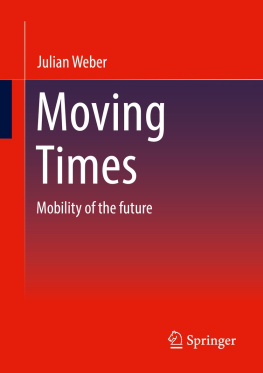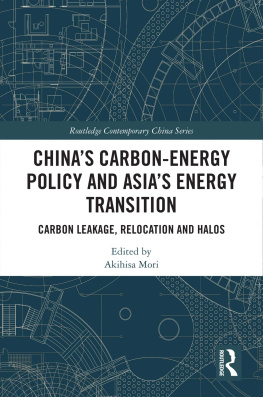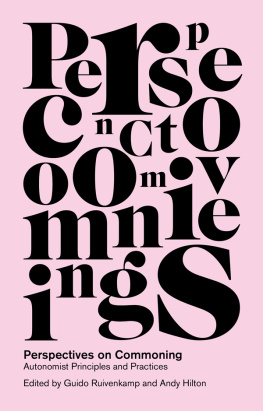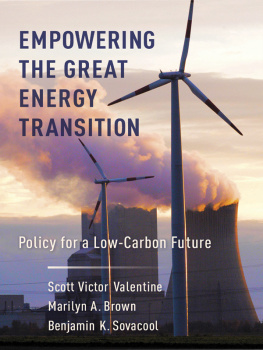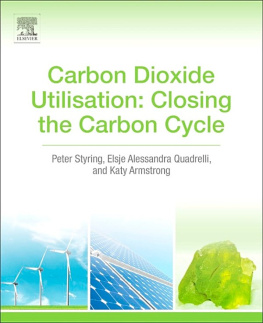Moving Towards Transition
JUST SUSTAINABILITIES
Just Sustainabilities contributes to understanding, theorizing and ultimately developing strategies towards the development of more just and sustainable communities in both the global North and South. Through a collection of solutions-orientated books, the series looks at policy and planning themes that improve peoples quality of life and well-being, both now and into the future; that are carried out with an intentional focus on just and equitable processes, outputs and outcomes in terms of peoples access to environmental, social, political and economic space(s); and that aim to achieve a high quality of life and well-being within environmental limits.
SERIES EDITOR
Julian Agyeman
TITLES ALREADY PUBLISHED
Julian Agyeman, Introducing Just Sustainabilities: Policy, Planning, and Practice
Karen Bickerstaff, Gordon Walker, Harriet Bulkeley, Energy Justice in a Changing Climate: Social Equity and Low-carbon Energy
Peter Utting, Social and Solidarity Economy: Beyond the Fringe
Jenny Pickerill, Eco-Homes: People, Place and Politics
Dean Saitta, Intercultural Urbanism: Planning from the Ancient World to the Modern Day
Phoebe Godfrey and Mary Buchanan, Global Im-Possibilities: Exploring the Paradoxes of Just Sustainabilities
Moving Towards Transition
Commoning Mobility for a Low-Carbon Future
Peter Adey, Tim Cresswell, Jane Yeonjae Lee, Anna Nikolaeva, Andr Nvoa and Cristina Temenos
Contents
Forms of mobility in Zelinskys mobility transition hypothesis |
Multiple levels as nested hierarchy |
A revised Multi-Level Perspective on transitions |
Reshaping commuting practices through the material elements and timing and spacing of societal services and institutions |
Congestion Free Network a quick summary |
Reducing one tonne of greenhouse gas per day |
Advertising lifestyle changes in Singapore |
Reduction is a theft |
Santiago region with Costanera Norte outlined in blue |
Costanera Norte |
The research upon which this book is based was funded through a grant Living in the Mobility Transition, funded by the Forum Vies Mobiles /Mobile Lives Forum ( en.forumviesmobiles.org ) and through the directorship and input of Christophe Gay, Sylvie Landrive and Javier Caletrio. We thank them for their generous support and guidance within the research phase of the project, but also Mimi Sheller who acted as an external advisor for her insightful comments and critique, and David Bissell for his guidance on an early version of the books proposal. We are also grateful for the chance to have the work overseen and commented upon through an advisory group, the Mobile Lives Forum assembled in Paris. We also acknowledge financial support from Northeastern University and from the Department of Geography at the University of Manchester for the redrawing of several figures used within the book.
The original project team also included Astrid Wood, who worked initially on the UK, South Africa and Turkey case studies on the project before taking up a lectureship position after a year in the post. We thank her for her work and perspectives.
We would like to acknowledge the time and enthusiasm of the many participants involved in this research from fourteen different countries and personnel from within the EU and the UN. Thanks and acknowledgements go to Generation Zero and Korea Climate and Environment Network for permission to reproduce figures used within the book, and to Eduardo Osterling for research assistance in Santiago.
In the course of this research we have benefited from audience remarks, questions and suggestions at workshops and academic conferences, including Landscape Surgery and colleagues at Royal Holloway University of London; sessions we organized at the RGS-IBG in Exeter 2015; joint conference T2M and Cosmobilities Network, Caserta, in 2015; a panel at the Association of American Geographers Annual Conference in 2016, audiences at the T2M conference in Mexico City 2016; the Cosmobilities Conference at Bad Bol, Stuttgart, 2016; the Society and Environment Research Group in the Department of Geography at the University of Manchester, and Cities Politics and Economies Writing Group at the University of Manchester; the 9th International Conference on Urban and ExtraUrban Studies in Heidelberg, 2018.
In the process of the grant and writing and completing this manuscript, five babies arrived within the households of this team of co-authors! We thank our families and partners for their amazing love and support.
We write ). Scientists, politicians, journalists and others are wondering if the Covid-19 crisis might lead to a permanent, crisis-induced transition to a lower-carbon future. Airlines are talking about a long-term reduction in business and the need to significantly downsize as passengers will be wary of travelling in such close quarters even after bans are lifted.
Covid-19 is a global crisis leading to millions of deaths worldwide. Governments have ostensibly responded to that direct threat by reducing the means for the virus spreading the ways we move. From limiting daily walks to banning incoming passengers, governments have sought to flatten the curve in order to save lives. While the discourse of economic (neo)liberalism has certainly continued, it has largely been drowned out by the threat of societies unable to cope with significantly increased mortality. Alongside the dramatic reductions in GHG emissions largely caused by reductions in, and transformations of, mobilities, there have been significant economic downturns which have been deliberately engineered by governments. The UKs GDP fell by 19.1 per cent in the three months to May 2020. Similar effects are being felt around the world. While the exact links between Covid-19, GHG emissions and economic growth are nuanced and varied, and indeed still emergent, the current crisis makes one thing clear. If a threat is perceived as big enough, governments have it within their grasp to think and act differently, in ways that can very quickly bring about at the very least a temporary transition in the ways we move or do not move. The question then emerges, why havent governments reacted in a similar way to the crisis of global heating a crisis that is also causing millions of premature deaths as well as mass migration, poverty and homelessness on massive scales? And while the consequences of Covid-19 are stark, the long-term consequences of global heating caused by GHG emissions are many times worse.
We live in a time of human-induced global heating. The production of greenhouse gases by humans is the prime cause of contemporary climate change. These gases include water vapour, carbon dioxide, methane, nitrous oxide and ozone. Since the advent of the industrial revolution the production of carbon dioxide has increased by 40 per cent such that the atmosphere now (2020) has around 415 parts per million (ppm), whereas in 1750 it would have been around 280 ppm. The research for this book started in 2013. In that year, carbon dioxide topped 400 ppm for the first time. It has increased by 15 ppm as we have been writing and researching. In that time, and for long before, human activity has resulted in the emission of carbon into the atmosphere. These emissions result from the combustion of carbon-based fuels such as coal, gas and oil which have been necessary for the production and maintenance of industry and economic growth, and have sustained our lifestyles and livelihoods, albeit in highly unequal ways across the globe (). Industrial-scale combustion, as well as personal and domestic heating, has involved massive socio-material transformations. While these have raised our living standards, they have also meant unearthing hydrocarbon-rich materials from the ground, moving them about the planet and releasing into the air, the ground, waterways and our oceans ever more complex chemical materials and compounds. Some of the localized effects of these exhaustions are expressed on the body and the landscape around us. Air pollution is perhaps one of the most deadly of these. The semi-visible atmospheres of urban haze and smog belie their roles as semi-visible killers in the form of complex respiratory diseases and cancers. D. Asher Ghertner has recently discussed this in the terms of a so-called Airpocalypse (2020) .


